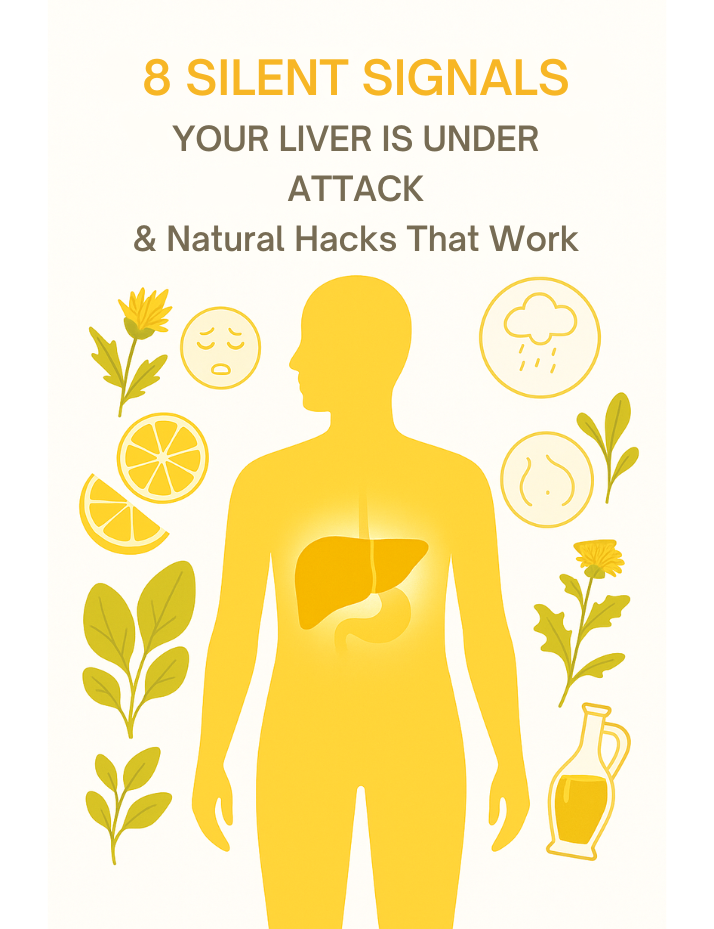And Natural Hacks That Work
When your skin’s in trouble, it shows. Rashes, redness, itching…you know something’s up.
When your respiratory system is under attack, you feel it. Coughing, sneezing, congestion…it’s loud and clear.
But what about your liver?
This silent powerhouse performs over 500 life-sustaining functions, yet when it’s under stress or starting to fail, it screams for help, but you might not be aware of its symptoms.
Most people brush its symptoms off for days—sometimes years—without realizing their liver is waving a red flag.
Experts say that if liver stress is caught within the first 48 hours of symptom onset, your body has a remarkable ability to bounce back.
But ignore those signs too long, and you risk progressing into chronic inflammation, fatty liver disease, or worse, without even knowing it’s happening.
Before you read another word, take this quick self-check. Answer each with Yes or No, then tally your “Yes” answers to see if your liver is whispering—or screaming—for help.
- I wake up feeling groggy even after a full night’s sleep.
- My digestion is unpredictable: bloating, constipation, or indigestion pop up regularly.
- I experience brain fog or forgetfulness at least twice a week.
- I get mood swings: irritability, anxiety, or low mood for no obvious reason.
- My skin flares up with breakouts, itchiness, or a dull complexion.
- I rely on caffeine or sugar to power through afternoon slumps.
- I often wake between 2–4 AM and can’t fall back asleep.
- I’ve been told I have fatty liver, elevated liver enzymes, or gallbladder issues.
- I drink more than three alcoholic beverages (or their equivalent) each week.
- My diet is heavy on ultra-processed foods, sugary drinks, or fast food.
Score:
- 0–2 Yes: Your liver is probably holding up well…keep these habits!
- 3–5 Yes: Some red flags…time to tune in and make changes.
- 6–8 Yes: Warning lights…commit to a focused 14-day liver reboot.
- 9–10 Yes: Serious strain…seek medical testing and professional guidance.
If Your Score Is 3+ , Read On
Your liver just told you it’s time to pay attention. This guide will show you what your liver really does, why modern life overwhelms it, how to spot early trouble, and the exact diet, lifestyle, and natural protocols to restore its power, starting today.
What Makes the Liver so Important?
Your liver is a three-pound metabolic marvel tucked beneath your right ribcage. It runs non-stop, day in and day out, orchestrating hundreds of life-sustaining tasks: filtering blood, neutralizing toxins, manufacturing bile, balancing your blood sugar, storing energy and vitamins, and even mounting immune defenses.
Think of your liver as a master chemical plant and filtration system all in one. Every time you eat, drink, or breathe, this organ leaps into action:
- Filtering and neutralizing toxins. Enzymes in your liver convert dangerous compounds—from alcohol and medications to environmental pollutants—into forms your body can safely eliminate via urine or bile.
- Producing bile for digestion. Bile is your body’s natural detergent, breaking down fats so you can absorb essential fatty acids and fat-soluble vitamins.
- Metabolizing nutrients. Excess glucose becomes stored glycogen, ready to be released when you need a quick energy boost. Proteins and fats are reshaped into cholesterol and lipoproteins critical for cell structure and hormone production.
- Supporting immunity. Specialized Kupffer cells patrol the blood, gobbling up bacteria and debris that slip past your gut barrier.
When it’s humming along smoothly, you probably don’t even notice your liver’s behind-the-scenes work.
But let any of those functions slump, and you start to feel sluggish, forgetful, and just plain off.
The Daily Assault: Why Your Liver Might Be Under Siege
Modern life exposes us to an unprecedented number of chemicals and pollutants that can overwhelm our liver’s detox capacity. We didn’t evolve to handle the barrage of toxins we face today, and our health can show it. Here are a few major factors that can lead to a “toxic” or overworked liver:
- Environmental pollutants. Tiny particles (PM2.5) from traffic exhaust, industrial emissions, and even household cleaners sneak into your bloodstream—then settle into your liver, where they trigger inflammation.
- Forever chemicals (PFAS). Found in nonstick pans, stain-resistant fabrics, and food packaging, these compounds resist breakdown and accumulate in your liver, subtly nudging up your risk of fatty liver disease.
- Pesticides and additives. Every bite of conventionally grown produce or processed snack can introduce dozens of new chemicals for your liver to dispatch.
- Alcohol and common drugs. Your liver races to clear each drink and every dose of acetaminophen, sometimes producing toxic by-products that injure liver cells if you overdo it.
- Sugar and unhealthy fats. High-fructose corn syrup and trans fats fuel fat accumulation in liver cells, setting the stage for non-alcoholic fatty liver disease (NAFLD).
- Chronic stress and poor sleep. Elevated cortisol and disrupted sleep patterns alter blood flow and hormone balance, quietly impairing your liver’s ability to clean house.
Left unchecked, these factors jam your liver’s detox pathways, leading to oxidative stress, inflammation, and eventually dysfunction. The result is often inflammation and oxidative stress in the liver, which further hampers its function.
Now, let’s discuss signs that your liver may be under stress.
The Whispered Warning Signs of a Struggling Liver
Because the liver itself has few pain receptors, its distress signals are subtle, but telling:
Physical clues
- Persistent fatigue despite adequate rest
- Bloating or digestive issues as bile production and flow slow
- Skin changes like unexplained itchiness, acne, or a sallow complexion
- Jaundice (yellowing of the skin or eyes) in more advanced stages
Cognitive clues
- Brain fog or difficulty focusing, as unmetabolized toxins circulate to the brain
- Memory lapses or slower information processing
Emotional clues
- Mood swings, irritability, or unexplained anxiety and depression, fueled by inflammatory molecules
- Nighttime awakenings—especially around 2–4 AM—when your liver is supposed to be in full detox mode
Individually, any one of these symptoms can have many causes. But if you recognize several of these issues in yourself and you know you’ve been exposed to liver stressors (poor diet, alcohol, chemicals), it’s worth considering that your liver might be asking for help.
The good news is that the liver can often recover and symptoms improve when you adopt liver-friendly habits. Let’s look at some proven ways to do that.
Natural Ways to Support Liver Detoxification
Helping your liver essentially comes down to two things: reduce the incoming toxin load, and give the liver what it needs to do its job well. By making some targeted diet and lifestyle changes (and using a few supportive remedies), you can lighten your liver’s burden and even enhance its detox power.
1. Load Up on Liver-Boosting Foods
- Cruciferous vegetables (broccoli, kale, Brussels sprouts) ramp up Phase II detox enzymes that transform toxins into excretable compounds.
- Alliums like garlic and onions provide sulfur, a key player in neutralizing heavy metals.
- Leafy greens and beets support bile flow, while cilantro can help mobilize stored toxins.
- Hydrating fruits such as cucumber and watermelon flush waste products.
Aim to make at least half your plate vegetables at every meal and swap refined carbs and sugary drinks for whole-food options and herbal teas.
2. Make Hydration Your Habit
Water is the essential carrier for toxins routed out by your liver. Shoot for at least 8–10 glasses of filtered water daily, and consider adding a squeeze of lemon or a few drops of chlorophyll to boost bile flow and antioxidant capacity.
3. Move, Sweat, and Sleep
- Exercise mobilizes fat deposits in the liver and improves insulin sensitivity. 30 minutes of brisk walking daily can make a big difference.
- Sweating (through sauna sessions or hot yoga) opens another elimination pathway for toxins.
- Sleep is prime time for your liver to regenerate and for your glymphatic system to clear metabolic debris. Aim for 7–8 hours of restful sleep by winding down tech and caffeine at least an hour before bed.
4. Consider Advanced Toxin Removal
Dr. Isaac Eliaz, a leading integrative physician, has developed a comprehensive Liver Detox Protocol that many people follow as a structured program. It involves a few targeted supplements working together to repair the liver, bind toxins, and enhance elimination.
Two cornerstone components are Modified Citrus Pectin (MCP) and a liver herbal formula. MCP (such as Dr. Eliaz’s patented PectaSol®) is a special soluble fiber from citrus peels that travels through the body binding to heavy metals and other toxins, safely escorting them out via urine and stool.
It essentially acts like a gentle vacuum for circulating toxins, which lightens the load on your liver.
The protocol also uses an herbal detox formula, ecoDetox™, that contains liver-loving herbs and nutrients: for example, milk thistle, dandelion, cilantro, and sulfur-containing amino acids (like NAC and methionine).
These ingredients help the liver boost glutathione and bile production, repair damaged cells, and pull out stored toxins from the liver and other organs.
By combining fiber binders, liver-specific nutrients, and gut support, Dr. Eliaz’s protocol tackles detox from multiple angles.
And it’s so special because It’s designed to remove toxins from deep within the body while preventing “detox reactions”. People who follow this protocol often report improvements in energy, mental clarity, and liver enzyme levels.
5. Nightly Lemon & Olive Oil Tonic
As your body begins to clear toxins and rebalance, this simple drink can also offer surprisingly powerful liver support without pills or powders.
Used for centuries in Mediterranean and natural healing traditions, this whole-food liver tonic can enhance bile flow, support digestion, and gently prepare your system for deeper detoxification.
It’s a smart bridge between your daily habits and Dr. Eliaz’s advanced protocol.
Ingredients:
- 1 whole organic lemon (washed)
- 1 tablespoon organic extra-virgin olive oil
- 1¼ cups filtered or spring water
Instructions:
- Cut the ends off the lemon, quarter it, and remove any seeds.
- Add lemon (peel and all), olive oil, and water to a high-speed blender.
- Blend until smooth (or as close as possible).
- Pour and drink immediately.
When to Take It
- Best time: Right before bed on an empty stomach
- Alternate: First thing in the morning before breakfast
- How long: Drink daily for 2–3 weeks during your seasonal cleanse (spring and fall are ideal)
⚠️ Skip this drink if you have gallstones. If your gallbladder has been removed, you can safely enjoy it.
Why It Works
This simple blend does more than just hydrate:
- Whole Lemon (with peel): Rich in d-limonene, vitamin C, and citrus bioflavonoids, the lemon peel helps stimulate bile flow and supports liver detox enzyme systems.
- Extra-Virgin Olive Oil: Contains anti-inflammatory polyphenols and healthy fats that help emulsify fat-soluble toxins and escort them through bile for elimination.
- Blending the Whole Fruit: Unlike juice alone, blending keeps the fiber intact, which adds a natural binding element to help carry toxins out of the gut.
Final Takeaway: Cleanse Smarter, Not Harder
Liver detox isn’t about extremes…it’s about consistently reducing toxins and supporting your body’s natural pathways.
Load up on detox-friendly foods, stay hydrated, move daily, and prioritize sleep. Then, for deeper support, use Dr. Eliaz’s Liver Detox Protocol to bind and clear toxins safely.
And don’t overlook the simple power of the lemon & olive oil tonic, a natural, food-based way to boost bile flow and digestion during your seasonal reset.
Support your liver daily, and it will return the favor for life.

